9 million lives saved and counting
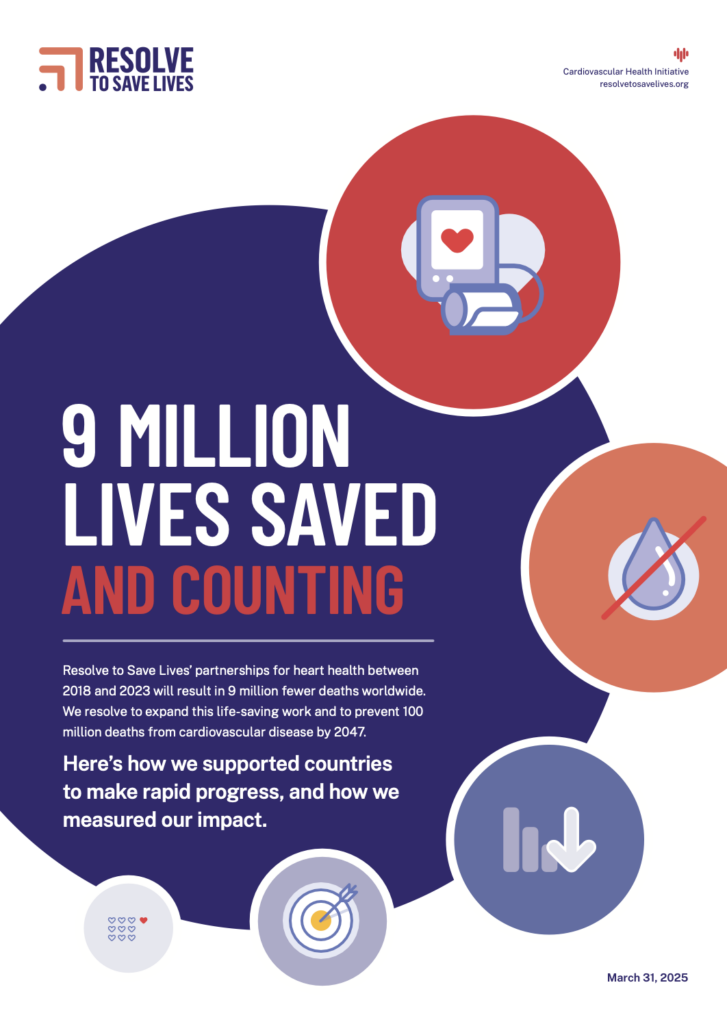
Resolve to Save Lives’ partnerships for heart health between 2018 and 2023 will result in 9 million fewer deaths worldwide. Here’s how we supported countries to make rapid progress, and how we measured our impact.
National guideline for the prevention and management of hypertension in Nigeria

National treatment guideline adopted in Nigeria to support the management of high blood pressure and improve access to medications.
Improving follow-up visits among individuals with hypertension: Quality Improvement project in the District Hospital, Seoni, Madhya Pradesh, India, 2021–2022

A quality improvement (QI) initiative conducted by the India Hypertension Control Initiative (IHCI) between January 2021 and September 2022 led to an increase in monthly follow-up visits from 21% to 37% and a decrease in missed health visits from 66% to 22%. Of the individuals counseled by ASHA home visits, 74.9% returned for follow-up. The […]
Fourth time a charm?—How to make the UN high-level meeting on noncommunicable diseases effective
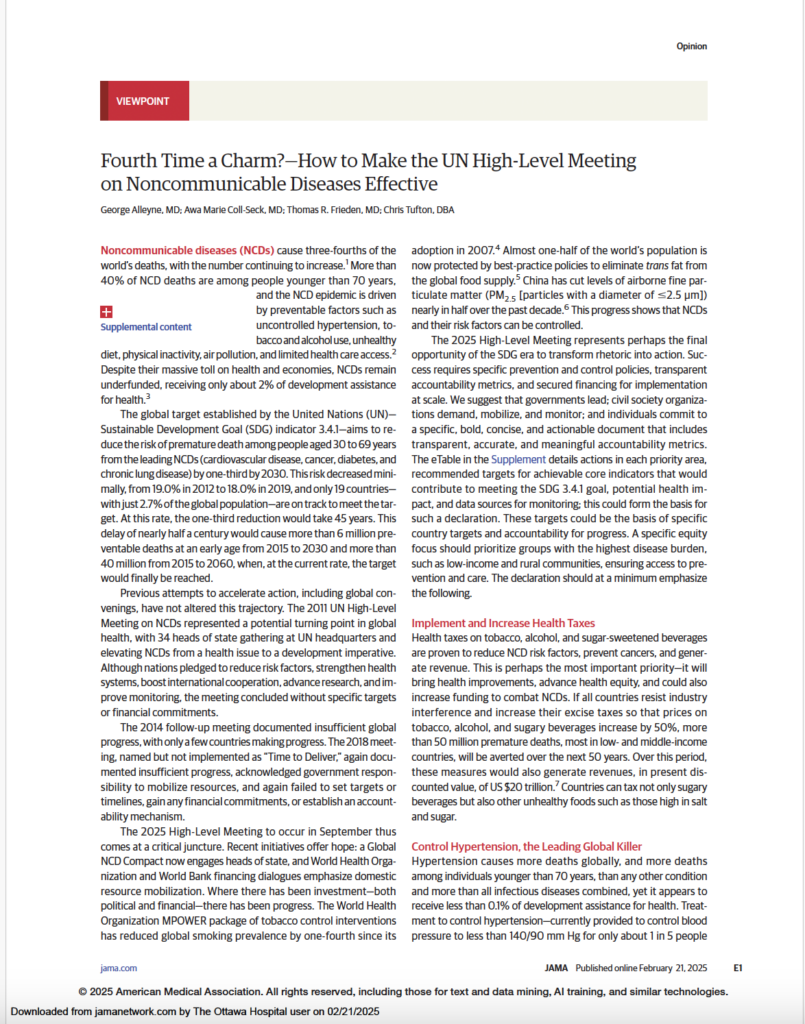
In a new article published in the Journal of the American Medical Association (JAMA), Dr. Tom Frieden and colleagues call for a focused strategy and more investment to address the world’s leading killer diseases. The article outlines specific, effective, and measurable steps countries can take to make progress and increase the chances that the upcoming […]
Managing cardiovascular disease with WHO HEARTS

A two-page advocacy brief developed by Resolve to Save Lives to highlight the key elements of WHO’s HEARTS technical package for managing cardiovascular disease:
Standard clinical protocols for managing hypertension

Using simple, practical treatment protocols standardizes a high quality of care and significantly improves health outcomes in large-scale hypertension control programs. Not only do they provide easy-to-follow, step-by-step instructions that empower non-physician health care workers to manage patient care closer to home, they also unlock bulk purchasing for essential medications, lowering costs and the risk […]
Unlocking health equity through free blood pressure medications
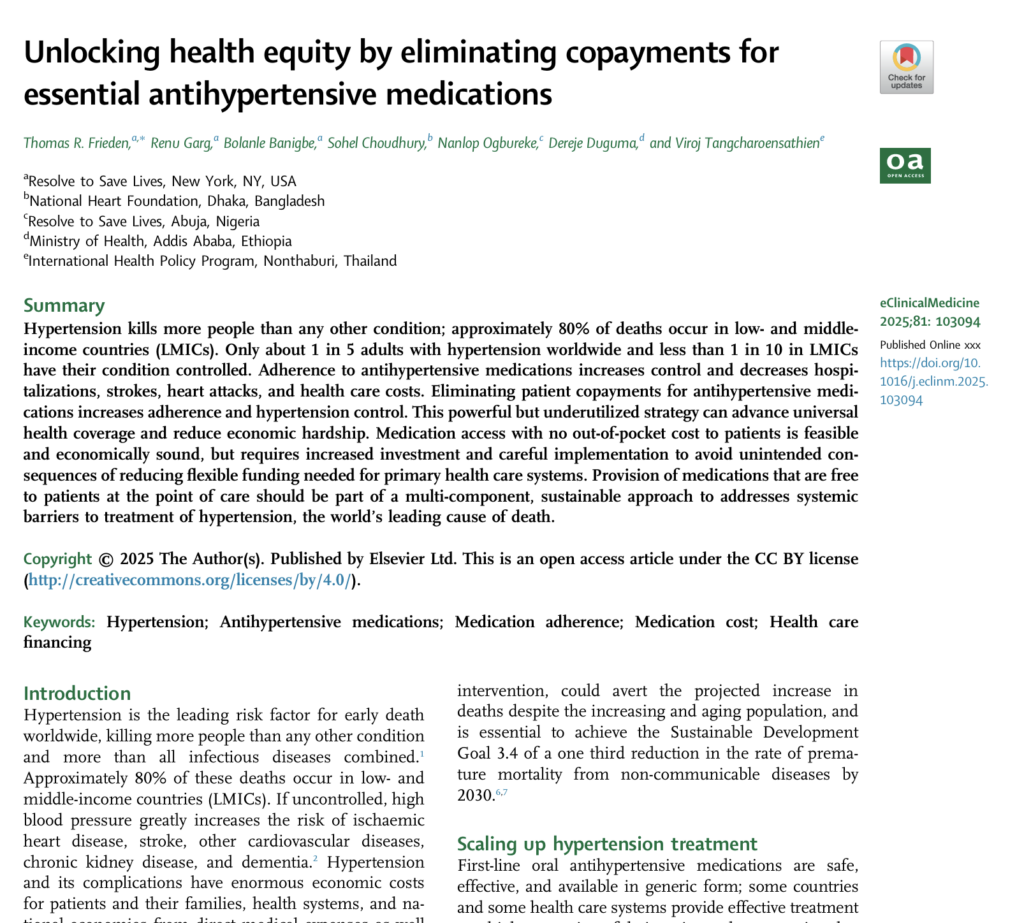
A new analysis by Resolve to Save Lives and partners is clear: removing patient copayments for anti-hypertensive medications reduces risk of heart attack, stroke, and hospitalization. Countries should explore providing free blood pressure medications as a way to save lives and meet sustainable development goals, particularly in LMICs where 80% of hypertension-related deaths occur and […]
Designing an optimal digital tool for hypertension and other long-term treatment programs
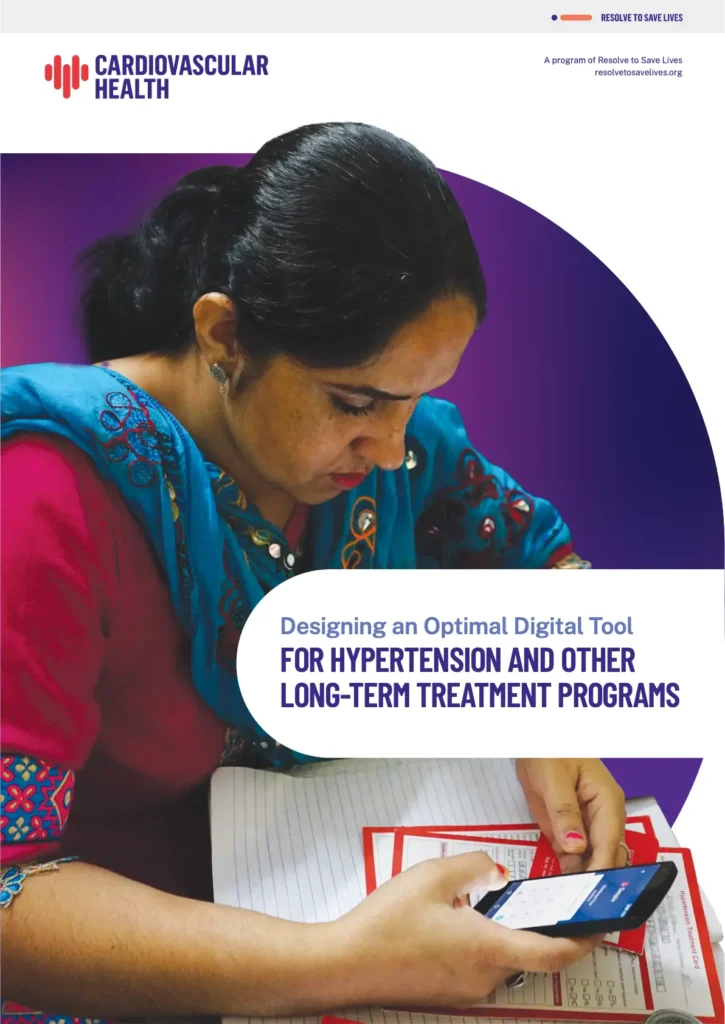
Playbook with step-by-step guidance for creating an effective digital tool for hypertension management and other chronic disease programs
Implementation of Global Hearts Hypertension Control Programs in 32 Low- and Middle-Income Countries

In the Journal of American College of Cardiology International, a summary of success, progress, and lessons learned during the first five years of the HEARTS initiative.
Effectiveness and safety of using standardized treatment protocols for hypertension

This new systematic review demonstrates that standardized and simplified hypertension treatment protocols significantly reduce high blood pressure compared with usual hypertension care. Simple hypertension management protocols streamline treatment steps, improving outcomes for patients and making medications more available and affordable. ABSTRACT Large gaps persist in the diagnosis, awareness, treatment, and control of hypertension globally. Standardized treatment […]
Integrated Antihypertensive and Statin Treatment Protocols for Cardiovascular Disease Prevention in Low- and Middle-Income Countries
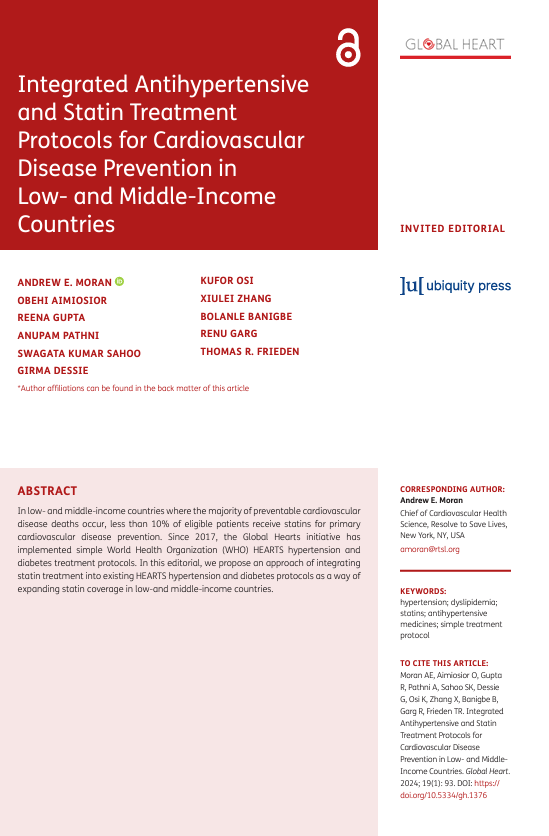
A new paper in Global Hearts co-authored by RTSL advocates for integrating hypertension medicines and cholesterol medicines into treatment plans to address the 90% of patients in low- and middle-income countries who don’t receive the cholesterol medications they need for primary cardiovascular disease prevention. Including statin treatment within existing HEARTS hypertension and diabetes protocols can help […]
Trends in hypertension prevalence, awareness, treatment, and control in the Thai population, 2004 to 2020
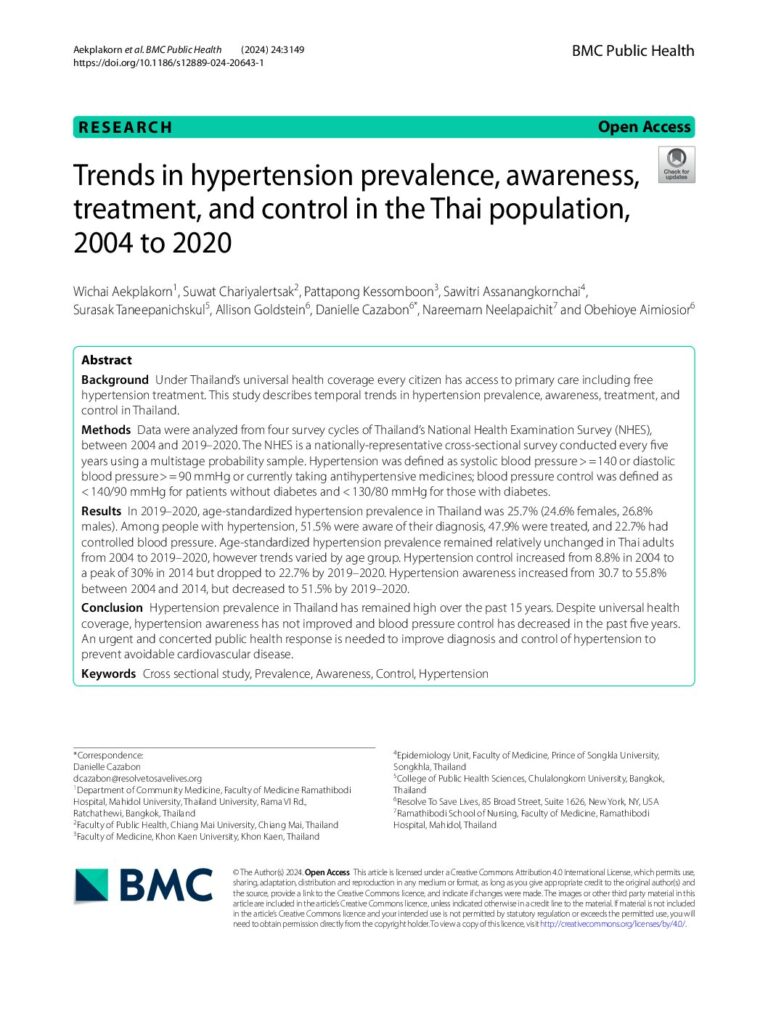
A new study in BMC conducted and funded by RTSL’s partners in Thailand analyzes trends in hypertension prevalence, awareness, treatment, and control in Thailand over the past 15 years. Despite significant strides such as the adoption of universal health coverage, hypertension awareness and blood pressure control remain a challenge throughout Thailand. An urgent and concerted public […]
Improving hypertension care among private sector providers in India

A recent analysis authored by RTSL and our partners in India shows a lack of awareness among private sector providers in India that high blood pressure is a critical health threat. Providing prescriptions to patients is the first step in increasing medication availability and affordability. To encourage evidence-based hypertension care, the government and NGOs could implement […]
Arm Position and Blood Pressure Readings: The ARMS Crossover Randomized Clinical Trial
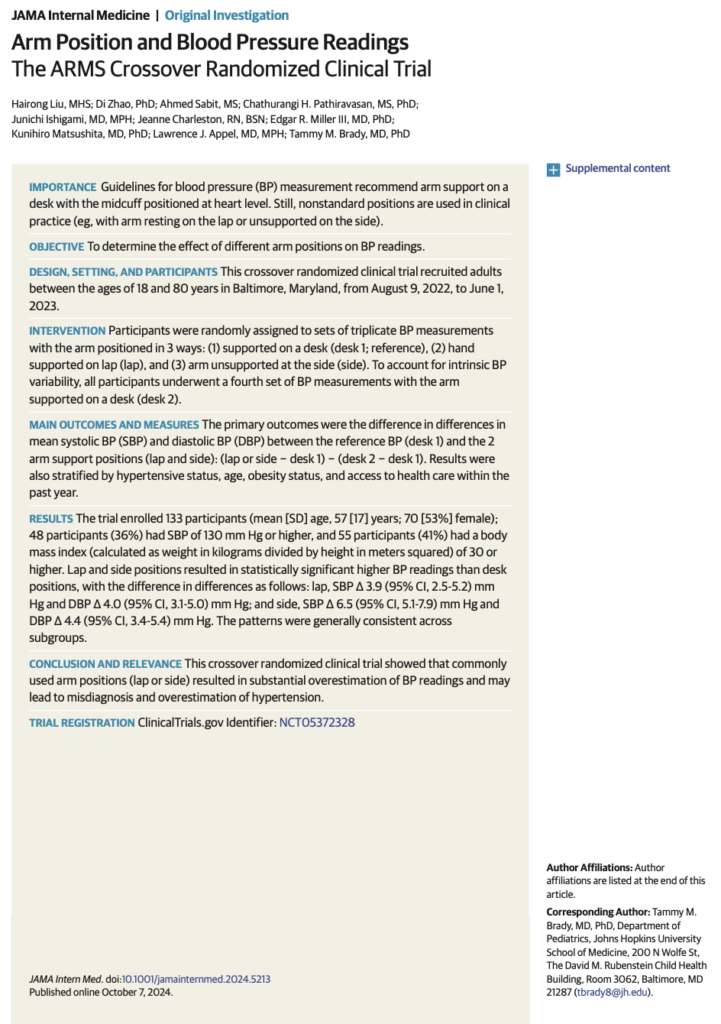
Faulty blood pressure readings can put lives at risk. A new randomized clinical trial shows that commonly used arm positions (lap or side) result in substantially higher blood pressure readings which can lead to false diagnoses and over-treatment. To measure blood pressures accurately, the arm should be supported at heart level. The authors call for clinical […]
Phone Calls to Overdue Patients with Hypertension – factsheet

This two-page factsheet outlines the key takeaways from the full guide, Guide for Management of Overdue Patients with Hypertension, and is designed as a resource for staff in your hypertension clinic. Other related resources: Designing an optimal digital tool for hypertension and other long-term treatment programs Leading a Good Data Review Meeting – full […]
Leading a Good Data Review Meeting – factsheet

This one-page factsheet outlines the key takeaways from the full guide, Leading a Good Data Review Meeting, and is designed as a resource for staff in your hypertension clinic. Other related resources: Designing an optimal digital tool for hypertension and other long-term treatment programs Guide for Management of Overdue Patients with Hypertension Phone Calls […]
Leading a Good Data Review Meeting

The ultimate goal of a successful hypertension program is to improve blood pressure control at the population level. Establishing regular data review meetings to review program progress using the HEARTS360 dashboard can enhance decision-making and build a culture of quality and accountability for large-scale hypertension programs. Use the following four steps to identify, address, and […]
Change Package: Overdue Patient Management

Program managers of large-scale hypertension programs can use the evidence-based interventions outlined in this new resource from Resolve to Save Lives to better track and manage patients overdue for a visit—and return them to care. Other related resources: Designing an optimal digital tool for hypertension and other long-term treatment programs Guide for Management of […]
Guide for Management of Overdue Patients with Hypertension

In this new guide from Resolve to Save Lives, large-scale hypertension programs can better find patients who are overdue for a health visit and bring them back to care. Reducing loss to follow-up is a leading way to improve hypertension control and reduce deaths from heart attacks and strokes. Phone calls, text messages, and home […]
Github page for DHIS2 hypertension and diabetes control package

Download the new DHIS2 hypertension and diabetes control package—a free, open-source health management data platform developed by DHIS2 and Resolve to Save Lives.
Factsheet for DHIS2 for Hypertension & Diabetes Programs

DHIS2 Tracker is a free, open-source health management data platform developed by DHIS2 and Resolve to Save Lives that program managers can use to monitor large-scale non-communicable disease (NCD) programs. The new version 2.0 integrates hypertension and diabetes care and is optimized for use in busy primary care facilities that manage thousands of patients. DHIS2 […]
Demo site for DHIS2 hypertension and diabetes control package
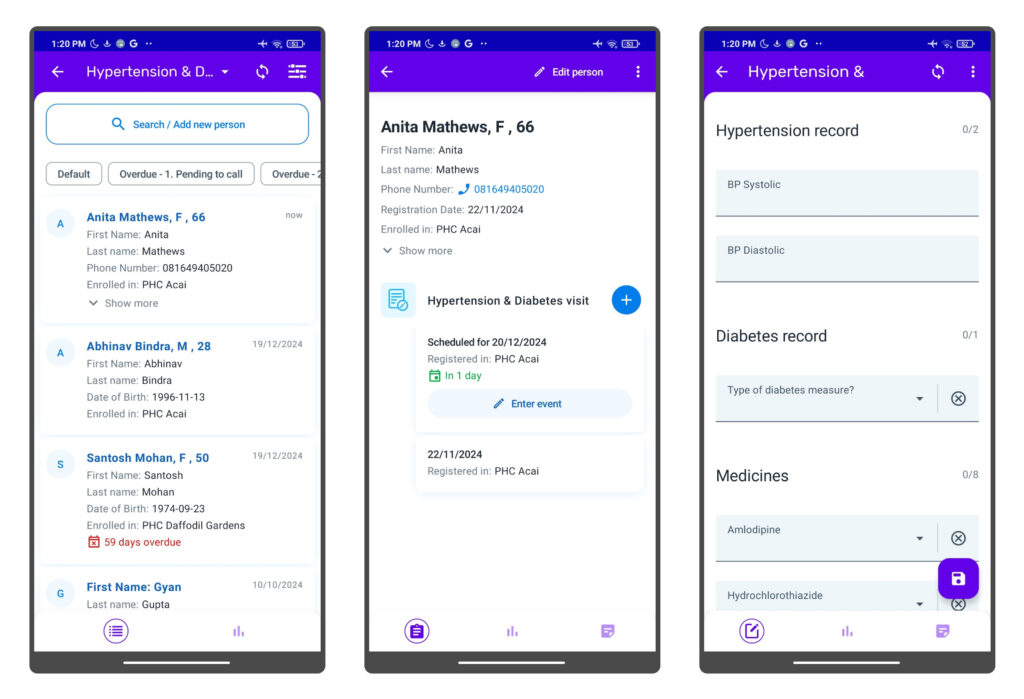
Demo the new DHIS2 hypertension and diabetes control package—a free, open-source health management data platform developed by DHIS2 and Resolve to Save Lives.
Decentralizing hypertension care in Punjab and Maharashtra States
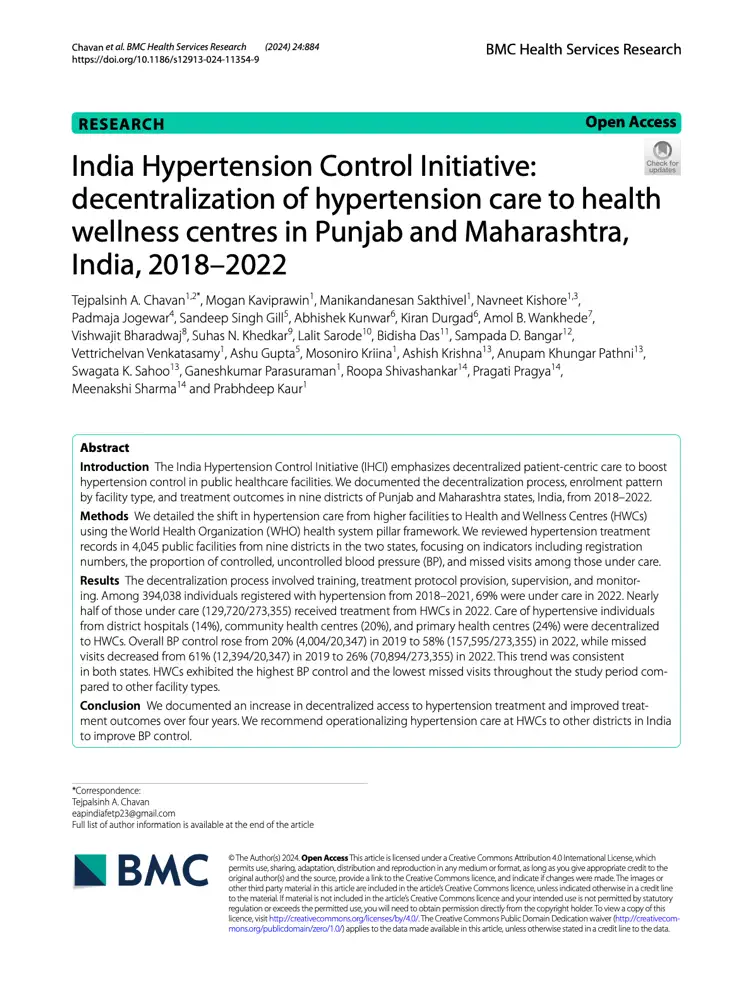
By bringing care delivery closer to communities, we can provide more people with access to quality care, improve hypertension control and save more lives. Our experts in India documented the decentralization process and its impact on patient outcomes in nine districts from 2018–2022.
7.5 million lives saved and counting

Resolve to Save Lives’ partnerships for heart health between 2018 and 2023 will result in 7.5 million fewer deaths worldwide. Here’s how we supported countries to make rapid progress, and how we measured our impact.
Patient retention to hypertension treatment: A mixed-method study from North India
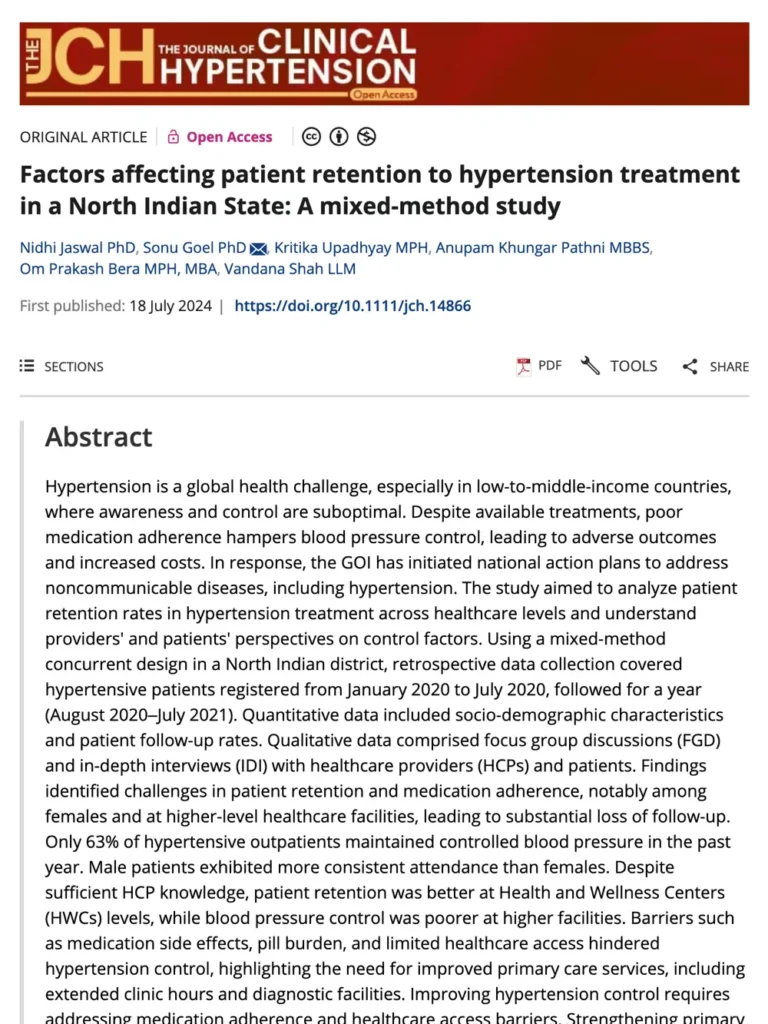
Improving hypertension control requires patient retention to hypertension treatment, which requires ready access to care. This study highlights the need for improved primary care services and patient-centered services, including extended clinic hours and diagnostic facilities. Experts from Resolve to Save Lives India analyzed patient retention rates in hypertension treatment using a mixed-method concurrent design in […]
Living Longer and Healthier: Integrating HIV and Hypertension Services for People Living with HIV in India
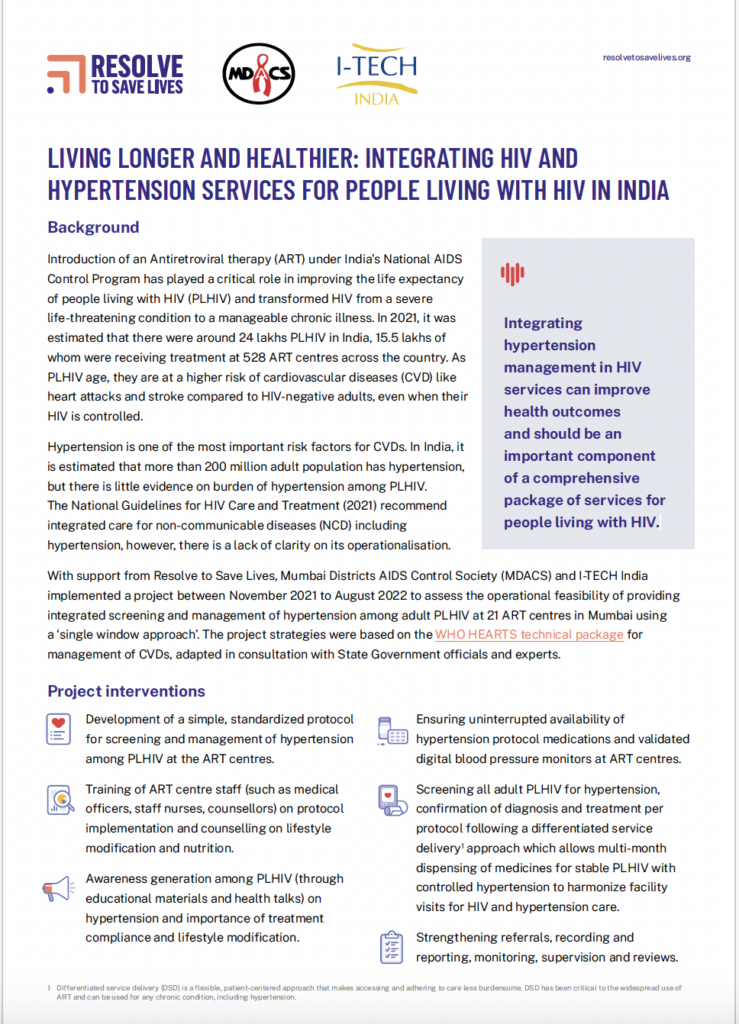
Learn how integrating hypertension management in HIV services improved health outcomes in India.
Lower Sodium, Longer Lives in India
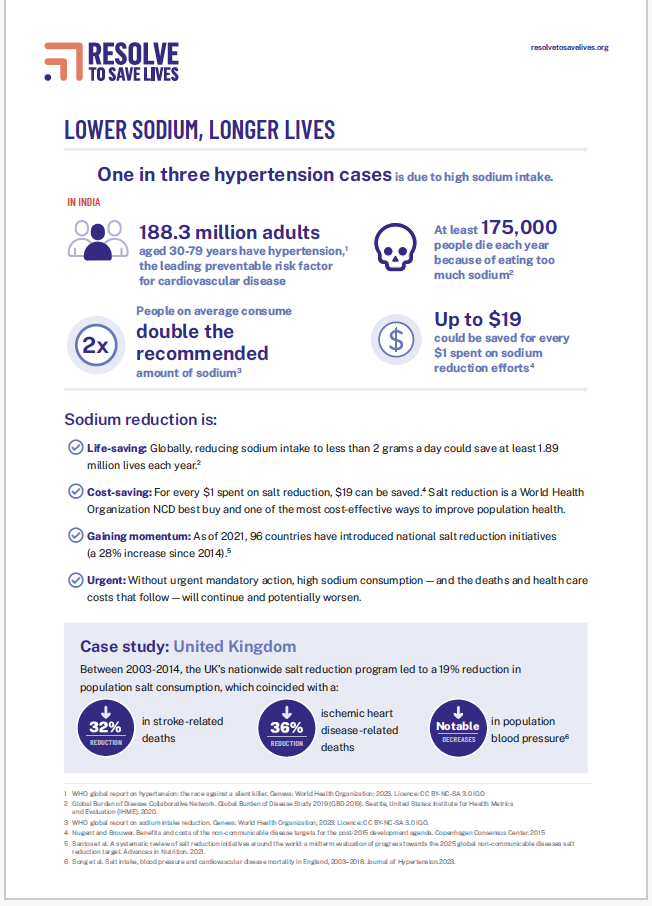
Sodium reduction is the single most important dietary intervention for improving heart health and saving lives in India. Learn more in this resource developed by Resolve to Save Lives.
Resolve to Save Lives: India Country Profile
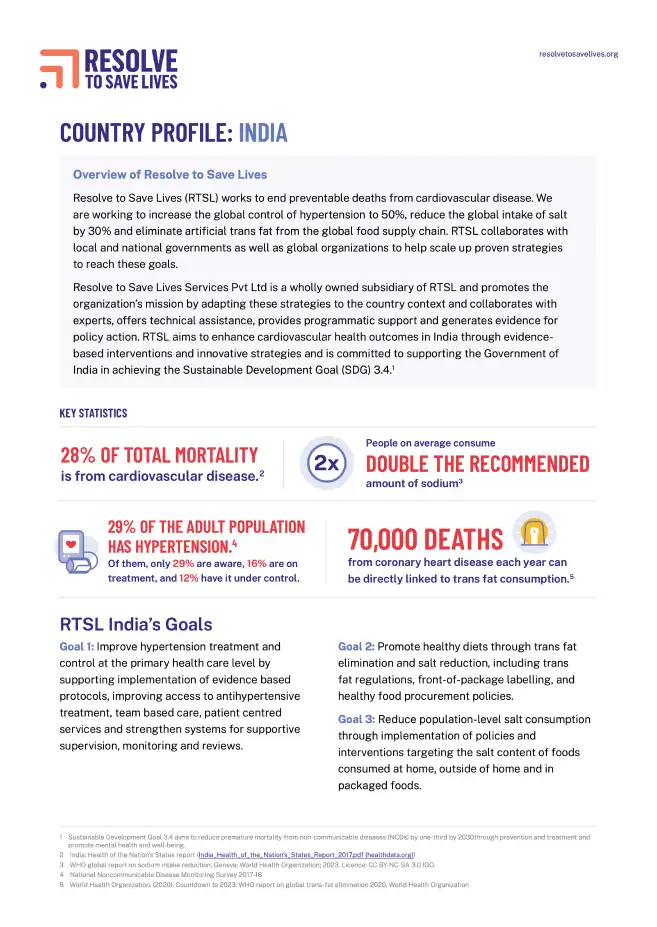
Learn more about how Resolve to Save Lives is working to end preventable deaths from cardiovascular disease in India.
Blood pressure poster study
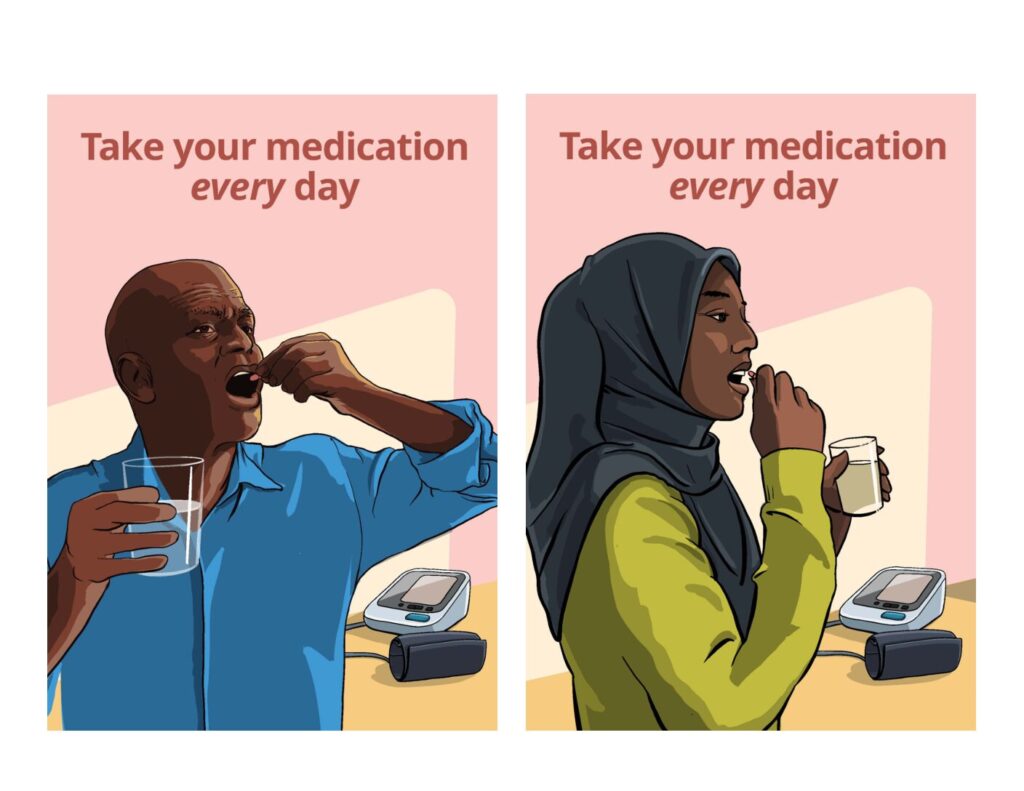
A qualitative study conducted by Resolve to Save Lives determined this poster to be the most impactful for encouraging patients to take their blood pressure medications daily. Forty patients from five different places said they prefer this poster because it shows someone actually taking their medication, which made clear what they needed to do.
Hypertension: A neglected global health crisis
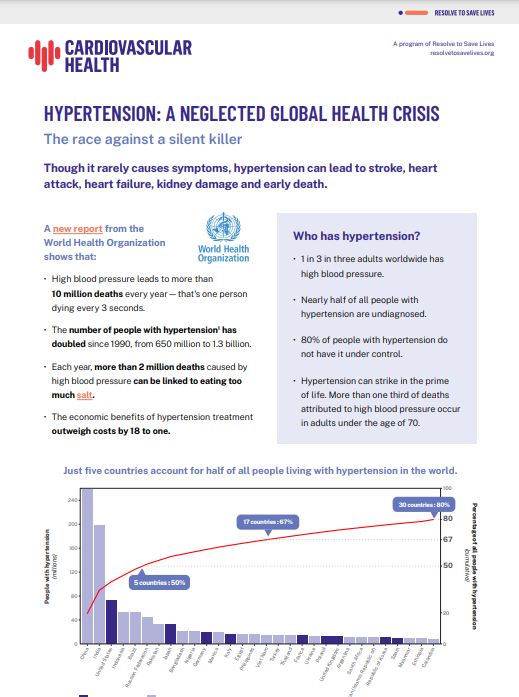
Key findings from WHO’s first-ever Global Hypertension Report, which shows that the number of people with hypertension has doubled since 1990, from 650 million to 1.3 billion, and the economic benefits of hypertension treatment outweigh costs by 18 to one.